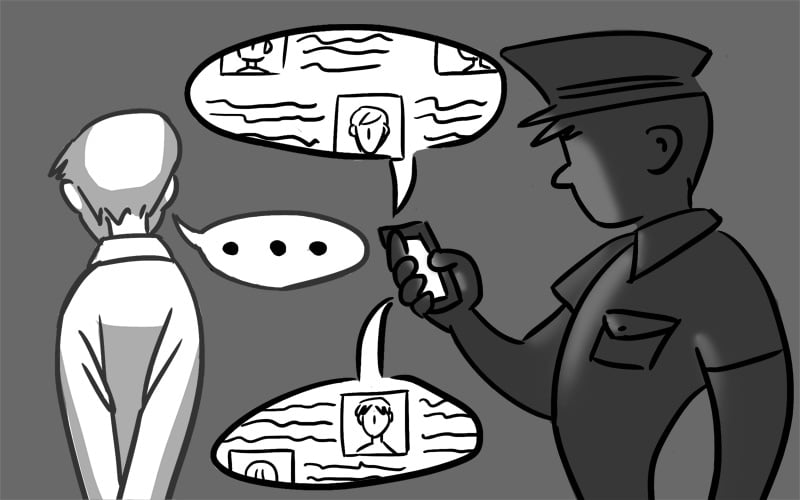
Police’s legal authority to search suspects’ cell phone data should depend on the severity of the offense and the need for relevant information.
In the Information Age, personal information has moved from file cabinets to computers to our pockets. With 61 percent of Americans now owning smartphones, law enforcement agents’ right to make unwarranted searches of these very personal devices has become a topic of contention. Cell phones are undoubtedly a vast and potentially valuable source of information for criminal investigators. But to what extent are officers violating citizens’ Fourth Amendment rights by searching and seizing cell phones upon — or sometimes even before — arrest? It seems, in many cases, that either privacy or efficacy of law enforcement must be sacrificed. However, the establishment of practical rules that define the need for a warrant can simplify this currently divisive issue and protect privacy without obstructing justice.
Two recent Supreme Court cases involving unwarranted cell phone searches have brought this dispute to the fore. The first, Riley v. California, involves Californian David Riley, who was pulled over in San Diego for driving with expired tags. Police found guns under the car’s hood, prompting a search of his cell phone that indicated he might be involved in gang activity. Digital files extracted from the phone ultimately led to his conviction for several felonies.
The second, United States v. Wurie, centers around Brima Wurie, who was arrested in Boston, Massachusetts after police witnessed a drug-related transaction. At the police station, officers confiscated Wurie’s phone in order to trace an incoming call, which provided more evidence to assist in his conviction. Both cases’ outcomes support the idea of phone searches, but other situations demand police restraint.
This is because unwarranted cell phone searches have not always led to conviction and can be subject to misuse. On March 30, 2008, Nathan Newhard was pulled over for drunk driving in Culpeper, Virginia. In a routine search of his person, officers apprehended Newhard’s phone and uncovered nude photos of him and his girlfriend. The officers proceeded to share the compromising images around the police station. The violation of privacy caused Newhard to suffer from anxiety and ended up costing him his job as a public school teacher.
For the same reasons that cell phone searches can be an invaluable tool for criminal investigators, they can also be colossal violations of privacy. Smartphones can — and often do — contain private material such as appointments, photos, notes and emails, as well as personal information via health and banking mobile applications. Law enforcement’s ability to search through any phone’s information based solely on the owner’s arrest for a petty crime seems quite unsavory. Furthermore, policies like “stop and frisk” make it easier for law enforcement to violate people’s privacy without just cause.
Conversely, if a warrant is always required before cell phone searches, potentially case-altering information can fall victim to destruction of evidence. Some criminal organizations have their own information technology departments, capable of remotely wiping cell phone data upon an individual being taken into custody. In these situations, required warrants would destroy police officers’ ability to access the treasure trove of criminals’ smartphone information. This contrast speaks to the need for a clearer set of guidelines to determine whether or not a warrant might be required in a given situation.
One proposal allows unwarranted cell phone searches in “emergency cases” — an exception that already exists for searches of homes and computers. Another permits unwarranted searches when it is necessary to protect an involved officer’s safety. A distinction might also be drawn between serious and non-serious cases, keeping in mind whether not there is probable cause for a search. For example, in Riley’s case, finding guns in his vehicle might have permitted such a search. Newhard’s case, however, provided no such cause. Another option for striking a balance between maintaining privacy and facilitating police work could be limiting cell phone searches to only material relevant to the crime. Such qualifications aspire to limit the ability of law enforcement to “seize and search” cell phones, without cutting them off entirely from this potentially valuable source of investigative information.
As such, the justices have begun to propose similar rules that police officers can apply to determine whether or not a warrant might be required in a given situation. The gravity of the situation should ultimately determine how much latitude officers have — a terrorist attack that threatens millions, for example, requires drastic measures and a certain immediacy not justified by a minor drug offense.
It is evident from the many case-by-case distinctions that officers can’t use a “one size fits all” approach to warrantless searches. Although many of these proposals require clearer parameters, it is only through a discussion and exploration of such possibilities that a practical solution to this complex issue can be found.







